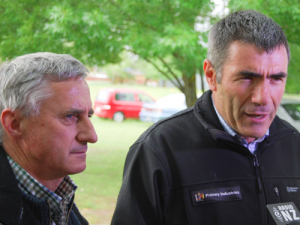The Government expects to announce a support package for farmers affected by the earthquake with the “next few days”, says the Minister for Primary Industries, Nathan Guy.
Guy was speaking at Waiau, near the epicentre of the first of Monday morning’s series of quakes, after a helicopter tour of the North Canterbury region.
“I must say the devastation is worse than I anticipated. The whole day I’ve been blown away by what I’ve seen,” he said.
Guy said the sea bed rise along the Kaikoura coast would cause a great deal of pain for the fishing industry and there was also “a lot of devastation” on the farms of the region.
“I am working up a support package; as we speak I’ve got my officials working on that. This is a severe event that’s going to take some time for our farming businesses to recover.”
Guy said farmers were not interested in a hand-out but wanted to know that the Government was interested and understanding of their plight.
It had been a long day for the Minister, who toured the area by helicopter accompanied by Federated Farmers President William Rolleston and Hurunui Mayor Winton Dalley, their itinerary frequently changing as they dodged rain cells blowing through on a cold southerly.
A few kilometres down the road a large aid convoy of army trucks was delayed at Culverden because the rain had increased the risk of slips on the partially-open inland route through Waiau to Kaikoura.
Guy said he hoped the road would be open by the weekend.
“I know a lot of Fonterra farmers will be pretty excited about getting their milk out of Kaikoura because at the moment a lot of that’s going into pasture.”
“It’s ironic that I’m here today and it’s raining in North Canterbury. I’ve had numerous visits over the last two and half years standing in brown paddocks so on one hand I’m excited to see the rain but probably farmers and small communities would prefer it not to be raining right now.”
Rolleston said land movement had ripped fences apart, broken water pipes and covered farm tracks.
“It’s really that infrastructure that farmers need, to get back on their feet.”
In the short term farmers’ immediate needs were their own domestic water, making sure they were fed and supported. For some of them a visit from a Federated Farmers-arranged helicopter on Wednesday was the first time they had seen anybody since the quake, he said.
Rolleston said farmers were “incredibly stoic and resilient” but it would be a long haul for them to get their assets back into shape and get their businesses going.
“The main thing is we need manpower but we need the right manpower. These are skilled jobs to get water back to stock, to fix fences and to deal with tracks with heavy machinery.
“The Minister’s right – farmers aren’t looking for a hand-out but we some some help in terms of logistics. Certainly from Federated Farmers point of view we’ve been putting a lot of resources into this exercise to get farmers helping each other because that’s what farmers do.”
Federated Farmers had set up two co-ordination centres in Amberley and Marlborough. Rolleston emphasised that anyone needing or offering help should phone the 0800 FARMING number.
He said “flying squads” of the Lincoln University Farmy Army volunteers were going around helping farmers to get various jobs done. Farmers appreciated the help, even for tasks as simple as moving stock from one paddock to another.
“I’ve been on a dairy farm today where the farmer couldn’t milk so he worked in with his neighbour and sent his cows across,” said Rolleston.
“There’s a lot of that happening all around the place particularly in Kaikoura and North Canterbury. That’s farmers just doing what they do – working with farmers.”



















